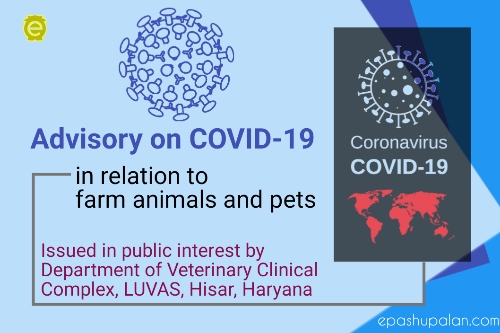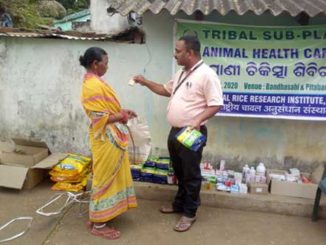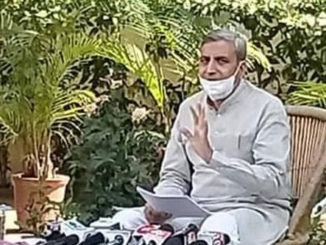“Advisory On COVID-19 in relation to Farm Animals & Pets” issued in Public interest by Department of Veterinary Clinical Complex, Lala Lajpat Rai University of Veterinary and Animal Sciences, Hisar, Haryana-India.

Facts
- As per OIE latest update, animals like cattle, buffalo, sheep, goat, chickens, pigs and pets including dogs and cats don’t show any important part in the epidemiology of COVID-19.
- As per CDC and OIE, no evidence till date suggests that pets spread COVID-19 to people.
- Positive findings in companion animals were ‘isolated cases’ associated with close contact with humans positive for COVID-19.
- World Organisation for Animal Health (OIE) and World Veterinary Association (WVA) advocate that specific activities of Veterinary Services are considered as essential services.
- Now telemedicine has been approved by Government of Haryana, so contact your local Veterinarian through phone for any help.
Animal Owner/Pet parent
- Animal owners/pet parents should practice good hygiene before and after feeding, watering or handling the animals/pets.
- Bathing cattle and buffaloes with water daily at home is advisable.
- Daily cleaning and disinfecting premises where animals are kept is recommended.
- Regularly groom your pet at least twice a day.
- Properly clean and dry pet’s food and water bowls as well as bedding and toys.
- Only visit Veterinary hospital in case of real emergency.
- Avoid travelling with your animals/pets.
- Avoid walking outside home with your pet. Indoor activities/exercises can be adopted by pet parents to keep pets active and healthy
- Sweeping/mopping of area where animals are kept twice daily with 7% Lysol or 0.5 % sodium hypochlorite* can be adopted.
- 7% Lysol Spray or 0.5 % sodium hypochlorite can be also be used as spray in places where farm animals are kept.
*1 part household bleach with 5% sodium hypochlorite to 9 parts water can also be used
If owner/pet parent contracted COVID-19 infection:
- Identify another healthy person who can take care of different activities of animals/pets.
- Strictly restrict contact with animals/pets as you restrict contact with other humans.
Practicing Veterinarians:
- Attend only acutely ill animals or emergency cases, Elective Procedures can be rescheduled.
- Actively participate in Telemedicine to avoid actual cases in the clinics.
- Preventive measures, such as vaccination against diseases with a significant public health or economic impact, should be undertaken.
- Strategic use of Personal Protective Equipment (PPE) including masks, gowns, gloves, shoe covers, caps and gloves is to be adopted.
- Properly autoclave and then discard any disposal originated from your animal clinics or working area.
- 70% ethyl alcohol to disinfect small areas between uses, such as reusable dedicated equipment (for example, thermometers) Sodium hypochlorite at 0.5% (equivalent to 5000 ppm) for disinfecting surfaces.
- Priority research activities (if any) should continue.
- Always wash hands after attending a clinical case/writing a prescription etc.
- Practice social distancing while taking history or attending a clinical cases.
- Protect your family by adopting all necessary practices issued by government of India for personals involved in emergency services.
- Any travel history of pet or pet parent should be ascertained
During COVID-19
- Pets can be a source of comfort during stress and lockdown, so don’t abandon them, they are your family.
- Livestock are source livelihood and are source of nutritious food so take all precautions that can be the source of COVID-19 virus.
Note:
- Issued in Public interest by Department of Veterinary Clinical Complex, LUVAS-Hisar, Haryana-India.
- These are general guidelines for animal owners and Veterinarians. Guidelines not applicable in Veterolegal cases.
- Please follow directions issued by local administration in legal issues.
- Advisory in Hindi and English can be downloaded from official website of LUVAS Click here
|
The content of the articles are accurate and true to the best of the author’s knowledge. It is not meant to substitute for diagnosis, prognosis, treatment, prescription, or formal and individualized advice from a veterinary medical professional. Animals exhibiting signs and symptoms of distress should be seen by a veterinarian immediately. |





Be the first to comment